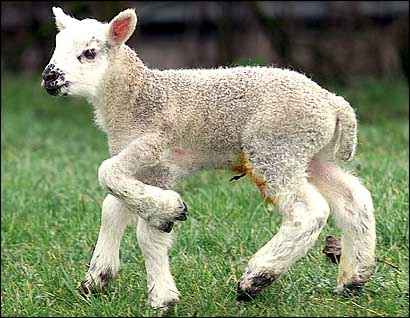
All text and images are protected under U.S copyright law.
Do not use without permission.

All text and images are protected under U.S copyright law.
Do not use without permission.

A mutation is a change in genetic material such as DNA or RNA. This occurs when there are copying errors in genetic material. Sometimes exposure to radiation or chemicals is responsible for the mutation.
Some mutations (germline) can be passed on to offspring, while others such as somatic mutations cannot be passed on to animal offspring, but can be passed on to plant offspring.
Evolutionists claim that evolution happens when millions of "good mutations" occur over a long period of time. These mutations are said to add genetic information to the organism causing it to evolve into another type of animal. While it is true that mutations occur, they cannot cause one type of creature to become another. Often natural selection weeds out mutations. This is Godís quality control department.
Mutations are rarely "good" or helpful to an organism. The plant or animal that is mutated is often worse off than he was before. There are also "neutral mutations"
| Besides, even when mutations do occur, they only scramble the genetic information that is already there. No mutation has yet been found that increased the genetic information. |  |
For example: If you scramble the letters in the word "Dinosaur", you can never spell words like "lion", "zebra" or "queen".
| Mutations may cause a sheep to have a 5th leg. But this is not evolution.
The sheep already had legs. This is just a mistake that occurred caused by a mutation.
Mutations will not allow a sheep to grow wings and evolve into a bird. A sheep does not have, and cannot
produce the necessary genetic information to produce a wing.
Mutations are almost always detrimental. A sheep with 5 legs is no better off than it was before. He can not run faster, or produce more wool.
|
 |
| Here are two cats that were born with 4 ears. This is another example of a mutation.
|
 |
Dr Lee Spetner, a scientist and teacher at Johns Hopkins University
speaks of the lack of new information produced by mutations. In his book:
"Not by Chance" he writes:
"...in all the reading I've done in the life sciences literature, I've never found a mutation that added information."
This man is not a student slack in his research, He is well educated in science and in the area of mutations.
He goes on to say that upon closer more in depth investigation:
"all point mutations that have been studied on the molecular level turn out to reduce the genetic information and not increase it."
This is exactly opposite of what evolutionists claim. They claim that mutations caused single celled organisms to evolve into people.
But, how could a single celled organism evolve into anything if a mutation would cause it to lose genetic information?
Evolution demands mutations that produce new information. But mutations cannot and do not provide new information.
Some Evolutionists like Pierre-Paul Grasse are starting to see this flaw in their theory. Grasse is on record as saying:
"No matter how numerous they may be, mutations do not produce any kind of evolution."
(revised quote book #72)
Mutations only corrupt the information already present. Leaving the organism with less genetic information, and a lower chance of survival.
This is in line with Biblical Creation, and the laws of Thermodynamics. The original Creation was perfect, and now because of sin it is starting to decay. The world and everything in it will continue to "unwind" and fall apart until the time when Christ comes.
If you have any questions on Creation, Evolution, or just want to say "Hi" please feel free to email me.

 | Main Index |
| Main Index | 